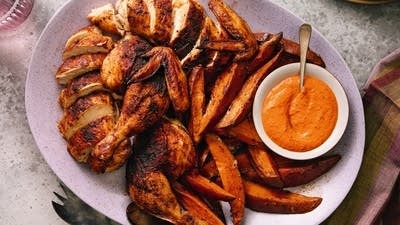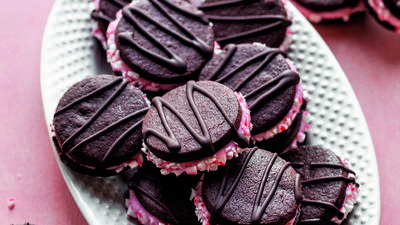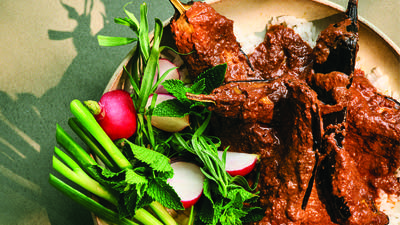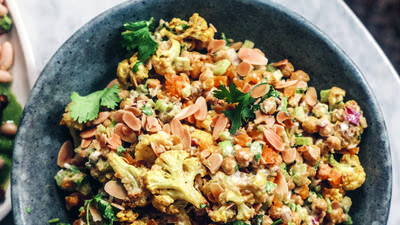
"Every time I decide how to walk into the kitchen, what to eat, how to feed my family, I'm making a decision about how I want to live my life," says Alana Chernila, author of The Homemade Kitchen. Her blog is Eating from the Ground Up.
On doing her best in the kitchen, then letting go
Joe Yonan: My favorite thing about your book is the collection of phrases at the beginning -- the ones that you organize your chapters around, the phrases that you have taped to your fridge: Start where you are. Do the work. Invite people over. Eat outside. Why do you have those on your fridge? What are you trying to remind yourself?
 Alana Chernila
Alana Chernila
Alana Chernila: That's the big question. I think that food means so much to all of us. We all have to eat. Every time I decide how to walk into the kitchen, what to eat, how to feed my family, I'm making a decision about how I want to live my life.
Those phrases really help keep me on track. When I start to feel overwhelmed, when I start to feel resentful of the work of making dinner, when I start to get too hard on myself or forget to find pleasure in dinner, those phrases have really been the thing that brings me back.
JY: They're your mantras.
AC: Exactly. I grew up as a child of a single mom, a hippie who always had Breathe on the fridge. It's always good to have a few messages on the fridge just to keep you on track.
JY: What I find so refreshing about your perspective is that you encourage people not to feel like things have to be perfect. That you do your best and let go. That's another one of your mantras.
AC: My favorite one.
JY: Can you explain more about what you mean by that?
AC: There really isn't any place for perfection in home cooking -- at least not in my home kitchen.
There are so many places to see beautiful food around us these days. Cookbooks are more gorgeous than ever; there's television; there are Instagram and Pinterest. A lot of these tools are really inspirational, wonderful and provide all sorts of good lessons for the kitchen.
But in the end, when we're just trying to get dinner out, the goal of the food that I'm cooking in my kitchen is to feed people. If it does that marginally well, I think it's a success. I find more and more that other people need to hear that, too.
JY: Especially parents.
 Chernila's recipe: Popovers
Chernila's recipe: Popovers
AC: Especially parents. We could talk about picky kids all day. I get emails from parents everyday who are saying, "My kid will only eat noodles. I feel like a terrible parent. What do I do?" And, "How do I get my kids inspired in the kitchen?"
My advice is always to relax, to do your best, put the foods that you love out there on the table. Know that nutrition is something that happens over a lifetime. If you're enjoying the kitchen and enjoying food, you're modeling that for your kids. It's the best we can do, and it's enough. It's good.
On 3 things to make at home
JY: You make many more things from scratch than the average bear. If you were to suggest a few places for people to start, things that you think can really make a difference, what would they be?
AC: I suggest starting with yogurt because that's something that a lot of people eat and spend a lot of money on. It's so easy and rewarding to make.
I'm a big preserved lemon person. I always have a big jar of preserved lemons in my fridge. I use them in everything. Anything that requires some lemon and some salt is made better by preserved lemons. I put it in my chicken soup and I put it in my hummus.
I find them to be a magical ingredient. I can make anything really, really good with preserved lemon. It adds a bit of funkiness. It's a totally new flavor than the lemon and the salt that create it. It's a little bit like a really great cheese. It's the thing that people will take a bite of whatever you've made and will be like, "What is in this? This is amazing." You can keep your preserved lemons a secret or you can send a jar home with them.
I feel the same way about crème fraîche, which is something that I always make at home. It's very inexpensive to make. It's great on tacos; it's wonderful on dessert. It's more mellow and sweet than sour cream. It's just really versatile. I love having it around. It's so easy to make at home.
On being resourceful in the kitchen
JY: You write really wonderfully about saving food, food scraps and avoiding food waste. What are some of your favorite ways to do that?
 Chernila's recipe: Stuffed Winter Squash
Chernila's recipe: Stuffed Winter Squash
AC: Being resourceful in the kitchen is something I get a thrill out of. I always feel like if I can save something that I would normally throw away, I feel like I'm sticking it to the man. Free food. I love it. There's a little thrill in it for me.
In the fall, I love to roast all my squash seeds. I'll toss them with spices and roast them in the oven. I get an extra snack from every squash that I roast.
In the summer I love to save all the hulls from my strawberries. If I'm making strawberry jam and I just have a big pile of strawberry hulls, I will put them in a pitcher of water.
I learned this one from a friend. I couldn't tell what she was doing when we were making jam together. She said, "You've never had strawberry hull water?"
You have to taste it to really believe it. It doesn't taste like strawberries; it just tastes fantastic. It's super, super refreshing and wonderful.
There are so many tricks. Our kitchens are filled with these treasures that we then throw away.
On her favorite food writers
JY: By the way you write, you obviously love words in addition to food. Who are some of your favorite people to read?
AC: My first favorite food writer was Laurie Colwin. I go back to her all the time. I love her novels, but her two food books, Home Cooking and More Home Cooking, are always on my desk. I read little bits of them whenever I just need to hear her voice. She's the queen of imperfection, home cooking and keeping it beautiful. I love everything that she wrote.
Also, there's a food writer named Patience Gray. A friend of mine gave me her book Honey from a Weed about 10 years ago. He told me it was going to change everything for me. It was pretty transformative.
JY: People don't really know about her. She was British, right?
AC: Yes. She wrote about her travels. She traveled all through Spain, Greece and Italy. She wrote this book about the connection between the people she met and the food that they ate. She just makes these amazing observations on those connections.
I feel like it's something that has really inspired me toward looking at how food affects how we live. It's really funny, and the recipes are great. I'm often giving this book as a gift because like you said, a lot of people haven't heard of her. She's a really good one to read.
Before you go...
Each week, The Splendid Table brings you stories that expand your world view, inspire you to try something new, and show how food connects us all. We rely on your generous support. For as little as $5 a month, you can have a lasting impact on The Splendid Table. And, when you donate, you’ll join a community of like-minded individuals who love good food, good conversation, and kitchen companionship. Show your love for The Splendid Table with a gift today.
Thank you for your support.
Donate today for as little as $5.00 a month. Your gift only takes a few minutes and has a lasting impact on The Splendid Table and you'll be welcomed into The Splendid Table Co-op.




